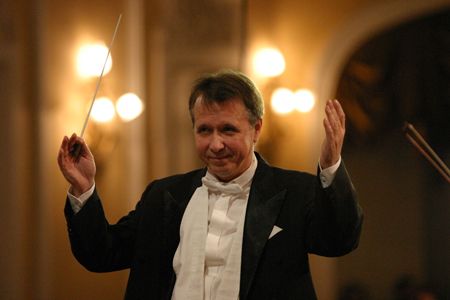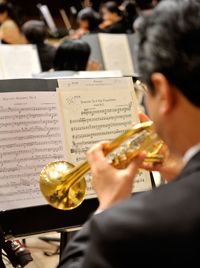Will Pletnev lead rebirth of KBS Symphony?

Russian virtuoso Mikhail Pletnev will conduct a special concert of the KBS Symphony on Nov. 30. / Korea Times file
After months of cancellations, the KBS (Korean Broadcasting System) Symphony Orchestra will finally hold a concert next month. All eyes will be on the Russian virtuoso Mikhail Pletnev, who has been offered a job as the new music director of the controversial ensemble.
Pletnev will conduct a special concert on Nov. 30 at Seoul Arts Center for the re-launch of the KBS Symphony as an incorporated foundation for the first time in the orchestra’s 56-year history. Formerly it had been operated as a state organization.
The international classical music circle is wondering whether Pletnev, who has founded and led the Russian National Orchestra (RNO) since 1990, will take on foreign orchestra as a full-time music director.
“KBS has just been released from the clutches of a tyrannical and incompetent political appointee, Hahm Shin-ik. It is holding mass auditions to fill 26 positions, including one concertmaster, assistant concertmaster and various principals,” British music commentator Norman Lebrecht wrote on hiswebsite last week. “Pletnev, who will conduct the KBS orchestra at the end of November, is the only candidate being considered for the job of music director.”
Philadelphia Orchestra’s music director Charles Dutoit was reportedly offered the position as well but has turned it down, according to latest news reports. The Swiss maestro molded to NHK Symphony in Japan as one of the top Asian orchestras during his tenure with from 1998-2003.
The management will confirm appointment of a new music director early next year, according to the PR team of the orchestra. The orchestra is holding auditions to hire 26 new musicians, including the key positions of the orchestras, for appointment in November.
The performance will be a good opportunity for fans and relevant parities to determine the rapport between the Russian maestro and the musicians. Pletnev has a large fan base here.
The KBS Symphony was established as an incorporated foundation as of Sept. 30 as a way of resolving chronic problems that have hampered the growth of one of the nation’s oldest orchestras.
The move came after months of disputes between the management and the musicians of the orchestra regarding the controversial leadership of former music director Hahm Shin-ik, a professor at Yale University.
There was a time when the KBS Symphony was considered the top of its field in Korea, ahead of the Seoul Philharmonic Orchestra (SPO) and some 20 other professional orchestras around the country.
But since the mid-2000s, the KBS Symphony has been in a downward spiral which culminated in an unprecedented cancellation of its regular concert series in March. The unfortunate incident is the first in its history, drawing criticism from fans and the press.
The KBS Symphony has virtually stopped functioning, particularly since the 2010 appointment of its music director Hahm, a self-made musician who rose from a humble background to become a faculty member at Yale University in the United States. The musicians have fervently protested the Hahm’s appointment, claiming that his musicianship is simply not up to the level they expect of a chief conductor.
The KBS Symphony has had a hard time finding a lasting leadership and worked with guest conductors until the appointment of Dmitri Kitaenko, who left in 2005.
The musicians have persistently demanded the appointment of a conductor “who is more qualified than Chung Myun-whun.” Chung is the renowned pianist-turned conductor who has led the SPO, a chief rival of the KBS Symphony, to an unprecedented level of international recognition for a Korean orchestra in recent years.
Pletnev vs. Chung
There are some parallels between Chung, 59, and Pletnev, who at 55 is one of the most lauded pianists ever to emerge from Russia.
They have both put their piano careers aside to focus on conducting. More importantly, they have both been deeply devoted to orchestral development in their homelands. After a brilliant career in Europe as an opera director, Chung repatriated to Korea to lead the SPO.
Despite a hectic schedule as a pianist, Pletnev founded the RNO in 1990 when his country was undergoing cataclysmic changes to fulfill his dream of a Russian orchestra independent of state control.
Both of their careers were launched after a phenomenal success at the piano division of the International Tchaikovsky Competition in Moscow. Pletnev won the competition in 1978. Chung was a second-prize winner in the 1974 International Tchaikovsky Competition, becoming the first Korean ever to win a prize at one of the most selective competitions in classical music.
In a short time, they have both established their respective orchestras as the finest in their countries.
Pletnev doubled as a pianist and conductor well into the 2000s. He is also a celebrated composer.
If he is appointed to lead the KBS Orchestra, it is likely that Pletnev will try to introduce more Russian composers to the local audience. The Grammy-winning virtuoso has championed forgotten Russian geniuses like Taneyev, the late 19th-century Russian composer who taught Rachmaninov, Prokofiev and Scriabin.
For his first concert with the KBS Symphony, he will conduct the Tchaikovsky’s “Suite for Orchestra No.3 in G major” and the Brahm’s “Violin Concerto in D major” in collaboration with violinist Alina Pogostkina, the 2005 winner of the International Jean Sibelius Violin Competition.
For more information on the concert, visit http://kbsso.kbs.co.kr. <The Korea Times/Do Je-hae>


























































